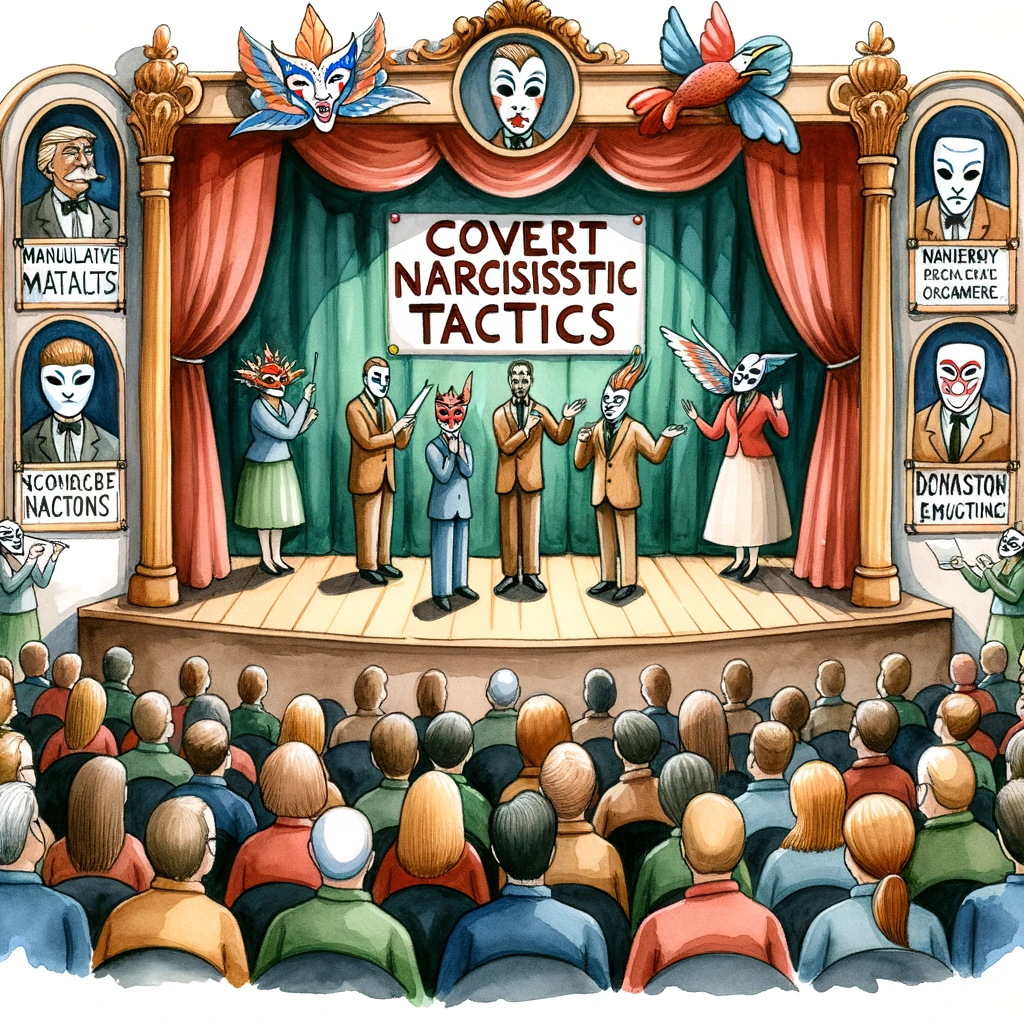Covert narcissists are masters at the art of manipulation. They will say anything to get what they want from you and not give a second thought about how it would make you feel. In an argument, they will use tactics like gaslighting, projecting, and lying to make you feel like you are the one who is wrong.
1) Gaslighting: Covert narcissists will deny that something happened or that something was said when you know for certain it did happen or was said. It’s a way for them to control your perspective of reality and keep you in an anxious state so they can continue their abuse without being called out on it.
2) Projecting: Covert narcissists will project their own faults onto others by accusing them of things that they themselves have done.
- “You don’t know what you’re talking about.”
- “I can’t believe you’re saying this.”
- “You’re the one with the problem, not me.”
- “I’m not going to do anything that could upset you.”
- “You’re so sensitive.”
- “I’m sorry I hurt your feelings, but…”
- “It’s your fault that I feel this way.”
- “Your not making any sence.”
- “You agreed to or you said.”
- “I don’t like the way you said that.”
- “You’re the worst …….”
- “No one else thinks that.”
- “Everyone else thinks.”
- Things Covert Narcissists Say in an Argument
- Leave all emotions out of the conversation.
- Think Counter Intuitve.
- How To Shut A Covert Narcissits Down.
- Signs To Look Out For When Spotting A Covert Narcissit.
- 1.What is a covert narcissist?
- 2.What are some things covert narcissists say in an argument?
- 3.What is the covert narcissist’s goal in an argument?
- 4.What are some ways to deal with a covert narcissist in an argument?
Things Covert Narcissists Say in an Argument
Covert narcissists are the hardest type of narcissist to identify. They are quiet, shy, and unassuming. But make no mistake, they are just as narcissistic as the rest. In an argument, a covert narcissist will say things designed to put you on the defensive and make you question yourself. They may say things like: “You’re too sensitive,” “You’re always overreacting,” “You’re making a big deal out of nothing.” They will try to gaslight you and make you doubt your own perceptions and memories. They may even play the victim, saying things like: “You’re always attacking me,” “You’re so mean to me,” or “Why can’t you just be nice for once?” covert
What To Say To A Covert Narcissist In An Argument To Shut Them Down.

When you are dealing with a narcissist, you are dealing with someone who has personality issues usually stemming from childhood. They have no boundaries and don’t understand what values are. They will do anything to get what they want because they feel entitled to it.
Covert narcissists have a tendency to be very reactive and over-sensitive when they are confronted with their own shortcomings. They might lash out, or they might withdraw and give you the silent treatment. The best way to handle this type of person is by not engaging in any further argument or discussion with them.
When you are dealing with a narcissist, you are dealing with someone who has personality issues usually stemming from childhood. They have no boundaries and don’t understand what values are. They will usually go to any lengths to control or win an argument.
If you are not ready to walk away or you simply don’t want to back down then there are some tools you can use to shut them down or check out what is the best way to out smart a narcissist.
It’s difficult to deal with a narcissist. Narcissists are masters of manipulation and will wear you down, but if you follow these steps, it’ll get easier.
Leave All Emotions Out of the Conversation.
You need to discuss the issue with the narcissist without showing any emotion in your tone and body language. If you want to start playing with them and shut them down permanently, you must not show any emotion. Stay in control, breath though it. Be cold towards them. You can vent later on, or go for a run to let off steam. Whatever you do, don’t feed into their narrative. Narcissists thrive off of your reactions and emotions.
Think Counter Intuitive.
You will have a hard time reasoning with a narcissist. They’ll spend any amount of time and effort to be right, and they want you to agree with them. Their intentions are to control you, make you think that you’re at fault
Narcissism is a personality disorder that has a variety of traits. One of them being the lack of empathy and inability to see things from someone else perspective. This disorder can be hard to deal with because they don’t care how they feel, how you feel, or what you think. They will do anything in their power to win an argument, no matter how hurtful it might be for you.
Forget showing up as a normal person who has a moral compass, good values and empathy towards others; you won’t win an argument with a covert narcissist that way.
That’s what we mean when we say “counterintuitive.” Whatever you think is normal behavior is not to a covert narcissist. You need to think the exact opposite.
How To Shut A Covert Narcissist Down.
You need to go in as cold as you can (remember no emotion whats so ever.) You need to be super clear with your words and keep your sentices short and direct.
The way I approach this is to try to keep your sentences short and direct. Go in cold as possible, no emotion.
You need to be clear with your words with short answers such as “no, no thanks” or “sorry, I can’t do that” or “I’m not going there.” You need to then follow it with silence, let silence speak volumes. You are simply delivering information.
Humans are often uncomfortable with silence, but it is an important tool in your communication arsenal. If you want to show someone that you are contemplating their question, or if they have said something that made you uncomfortable, silence is one of the few tools at your disposal.
You can also use phrases like “Ok” or “thanks” or “that’s fine with me.” But remember that you don’t want to give away your power to the narcissists; you can still be polite in a cold way. Don’t feed into their emotional trap.
A very powerful phrase, “I don’t care” is so powerful that it will completely shut down the narcissist. You take the power away from them and when they realize they hold no power over you, they’ll move on to their next victim. A narcissist needs to feel in control and valued. Here are some funny things you can say to a narcissist.
How To Spot A Covert Narcissist.

The fastest way to spot a narcissist is to figure out if they think of themselves as far superior to you and the people around them.
The covert narcissist is someone who believes they are superior to others, and that others are somehow inferior. They’re not open to other’s opinions, and don’t have empathy for others. Narcissists don’t care about the other person’s needs, because they’re so wrapped up in themselves.
They will often go unnoticed and most people will think they are brilliant, sweet people. The things that they do are small things that people won’t think are bad or underhanded at all.
Signs To Look Out For When Spotting A Covert Narcissist.
Passive Agrees.
Are they passive aggressive? What is passive aggressive behavior? According to https://www.verywellmind.com/
Passive-aggressive behaviors are those that involve acting indirectly aggressive rather than directly aggressive. Passive-aggressive people regularly exhibit resistance to requests or demands from family and other individuals often by procrastinating, expressing sullenness, or acting stubborn.
They will say they are going to do things but never end up doing them. When you try to bring the conversation up with them, they won’t confront you about it and will avoid the topic instead. They won’t act aggressive towards you in person but might behind your back.
Subtly Competitive.
Whatever you have, they have more of it or better than you. They will never be cruel to your face but they will always have something better or go to a better place than you.
Withholding Information.
They don’t tell you about something, they don’t tell you about an event or party they are attending. Even if it benefits them, they will keep it from you. Anything that can benefit you and not them is withholding something or information.
Extremely Insecure.
They play the victim, they play the martyr, they want you to think they are weak and have been dealt a bad hand in life.
They Are A Big Dreamer.
Most covert narcissits will dream big and say they are going to do this and that but when it comes down to the cruch they wont put in the work to get to where they want to be.
They Hold Grudges.
They hold grudges. They don’t know how to regulate themselves. They don’t value themselves. The only way a narcissist can value themselves is by other people’s validation or controlling someone else.
Jealousy.
A covert narcissist will be very jealous of any of your accomplishments or anything good in your life. When you tell them or they hear about it, they may say “fantastic” or “good for you” but there body language is off.
There are many more ways to spot a covert narcissist check out this wonderful YouTube clip by Rebecca Zung for more informaton on Narcissits.
60 Examples of A Covert Narcissist With Context And Scenarios

In a Relationship
“I never said that.” – Gaslighting their partner after making a hurtful comment.
“You’re too sensitive.” – Dismissing their partner’s feelings after a disagreement.
“I’m the victim here.” – Shifting blame after being called out for bad behavior.
“You always overreact.” – Undermining their partner’s reactions to their manipulative actions.
“I’m the only one who really cares about you.” – Isolating their partner from friends/family.
“You owe me for everything I’ve done for you.” – Using favors to manipulate.
“I know you better than you know yourself.” – Undermining their partner’s self-perception.
“Nobody else would put up with you.” – Making their partner feel unworthy of love.
“You’re imagining things.” – Denying their hurtful actions or words.
“I did that because I love you.” – Justifying controlling behavior as affection.
At the Workplace
“I came up with that idea first.” – Taking credit for a colleague’s idea.
“I can’t believe you’re questioning my judgment.” – Responding to constructive criticism.
“I don’t need help.” – Rejecting collaboration to maintain control.
“You wouldn’t understand.” – Belittling a colleague’s intelligence.
“I’m indispensable to this company.” – Overstating their importance.
“I deserve a promotion more than anyone else.” – Expressing entitlement.
“I’m too busy to help you.” – Dismissing others’ needs.
“You’re lucky to work with me.” – Elevating their own status.
“I’ve achieved this all on my own.” – Ignoring the contributions of others.
“I don’t make mistakes.” – Refusing to acknowledge errors.
In Friendships
“I always give, but never receive.” – Playing the victim to gain sympathy.
“You’re not being a good friend to me.” – Manipulating to receive special treatment.
“I don’t know where I’d be without you.” – Feigning dependence to control.
“You’re not living up to your potential.” – Undermining self-esteem.
“I only want what’s best for you.” – Justifying unsolicited advice.
“I heard what others say about you.” – Creating paranoia to isolate.
“I’m your truest friend.” – Undermining other relationships.
“You always disappoint me.” – Manipulating through guilt.
“I can’t believe you’re choosing them over me.” – Forcing loyalty tests.
“I forgive you for being a bad friend.” – Offering conditional forgiveness.
In Family Dynamics
“I sacrificed everything for this family.” – Guilt-tripping to gain control.
“You’re ungrateful.” – Dismissing family members’ achievements.
“I’m the head of this family.” – Asserting dominance.
“You owe me respect.” – Demanding submission.
“I know what’s best for you.” – Undermining autonomy.
“You’re ruining the family.” – Blaming others for their actions.
“I’m the reason for your success.” – Taking credit for others’ achievements.
“You’ll never be good enough.” – Undermining self-worth.
“I deserve to be honored.” – Seeking excessive admiration.
“You need to earn my love.” – Making love conditional.
During Conflicts
“You started this, not me.” – Avoiding accountability.
“You’re making a big deal out of nothing.” – Minimizing others’ feelings.
“I’m always misunderstood.” – Playing the victim.
“You can’t live without me.” – Asserting dominance.
“I’m too good for this.” – Elevating themselves above the situation.
“You’re trying to sabotage me.” – Projecting their insecurities.
“I’m always right.” – Refusing to compromise.
“You’re the problem, not me.” – Shifting blame.
“I’m above apologies.” – Refusing to apologize.
“You’re overthinking my words.” – Gaslighting.
In Social Settings
“I’m the life of the party.” – Seeking attention.
“People are drawn to me.” – Boasting about social influence.
“I have high standards for my circle.” – Expressing superiority.
“I don’t associate with just anyone.” – Isolating and selecting relationships.
“People envy me.” – Boasting about perceived envy.
“I’m a natural leader.” – Asserting dominance in groups.
“I have a special connection with notable figures.” – Name-dropping to elevate status.
“I don’t have time for small talk.” – Dismissing others as unimportant.
“I’m too sophisticated for this.” – Expressing disdain for social norms.
“People should appreciate my presence.” – Expecting special treatment.
Detailed analysis of various manipulative tactics commonly employed by covert narcissists
Detailed analysis of various manipulative tactics commonly employed by covert narcissists

1. Gaslighting:
- In Simple Terms: Imagine you clearly remember them insulting you yesterday, but today they swear it never happened. You start questioning if you made it all up in your head.
- Real-Life Chat: “I promise, I never said you were lazy. Are you sure you’re remembering that right?”
2. Projection:
- In Simple Terms: It’s like they call you a thief while they have their hand in the cookie jar. They accuse you of what they’re doing themselves.
- Real-Life Chat: “I can’t believe you’re accusing me of cheating, you’re the suspicious one here!”
3. Victim Playing:
- In Simple Terms: They mess up, but somehow it’s the world against them. They’re the “poor thing” in every story.
- Real-Life Chat: “After all I’ve done, this is how everyone treats me. It’s so unfair!”
4. Triangulation:
- In Simple Terms: They bring another person into the mix, maybe an ex or a friend, making you feel like you have to compete for their attention.
- Real-Life Chat: “Sarah always understood my feelings, you could learn a thing or two from her.”
5. Love Bombing:
- In Simple Terms: They shower you with love, gifts, and compliments until you’re head over heels, and then the control starts.
- Real-Life Chat: “You’re the most amazing person I’ve ever met, I can’t believe you’re mine!”
6. Devaluation:
- In Simple Terms: One day you’re their everything, the next you can do nothing right. It’s a rollercoaster of praise and criticism.
- Real-Life Chat: “I used to think you were incredible, now I see I was just blinded by love.”
7. Silent Treatment:
- In Simple Terms: They go ghost on you. No calls, no texts, nothing. It’s their way of punishing you without saying a word.
- Real-Life Chat: Reads your messages, no reply for days.
8. Entitlement:
- In Simple Terms: They act like the world owes them everything, and rules? Those are for other people, not them.
- Real-Life Chat: “Of course, I took the last piece of cake, who else deserves it more?”
9. Manipulation of Boundaries:
- In Simple Terms: Your privacy, feelings, wishes – they bulldoze over it all. Your stuff is their stuff.
- Real-Life Chat: “Why are you overreacting? So what if I went through your phone, we shouldn’t have secrets!”
10. Smear Campaigns:
- In Simple Terms: They spread wild stories about you, painting themselves as the saint and you as the villain.
- Real-Life Chat: “I had to tell everyone the truth about how unstable you are, they deserve to know what I’m dealing with.”
Questions and Answers
1.What is a covert narcissist?
A covert narcissist is a person who is excessively self-centered and narcissistic, but does not openly display these qualities. Instead, they often try to appear humble, altruistic, and shy.
2.What are some things covert narcissists say in an argument?
There are several things that covert narcissists say during an argument. One is that they are always right and that their opinion is the only one that matters. They will also say that their feelings are more important than anyone else’s and that they are always the victim. Covert narcissists will also try to control the conversation by interrupting others and changing the subject.
3.What is the covert narcissist’s goal in an argument?
The covert narcissist’s goal in an argument is to prove that they are right and the other person is wrong. They want to win the argument by making the other person look foolish or crazy.
4.What are some ways to deal with a covert narcissist in an argument?
Some ways to deal with a covert narcissist during an argument are to be assertive, set boundaries, and to take the emotion out of any conversation with them. It is also important to stay calm and to avoid being drawn into their games.
Final Thoughts
There is no arguing with a covert narcissist. They will never see your side of the story, and they will never admit that they are wrong. They will gaslight you and manipulate you into believing that you are the one who is crazy. The best thing you can do is walk away and never look back. For more on gaslighting check out this article.

